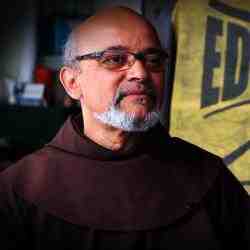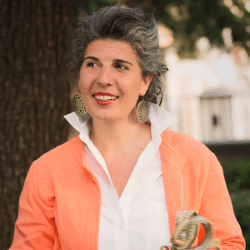Introduction
Seeking to combat hunger, Ninom Rouze has created a unique combined health and environmental education program among poor and indigenous agrarian communities in Brazil. Among other things, her program enables women to utilize everyday waste to supplement family nutrition.
The New Idea
Serving as a health agent in an indigenous village characterized by malnutrition and hunger, Ninom Rouze observed considerable wastage of nutritional foods in food preparation. The women food preparers were throwing away edible and nutritious seeds, greens and skins from fruit and vegetables. She decided then to use her cooking skills to develop delicious and nutritious recipes to supplement the local diet. Ninom has a practical message that women immediately understand. "To recycle in the kitchen," says Ninom, "means to create new habits, waste less, improve food quality and save money. Some time ago skins, seeds, bran and some leaves were considered waste or food for animals. Through the 'Cookery for Life' program, these elements become an important part of needed cereals." But her message goes further by promoting a holistic concept that links health and nutrition to environmental care. "Our first environment is our body and we have to care for its health in a way that does not harm the surrounding environment," she says. She argues that in order to understand food, one must also understand the environment in which it is grown. She shows women how to identify edible plants and other food sources, emphasizes the danger of pesticides and the importance of crop rotation and introduces a new awareness of the environment to her fellow cooks. In this process, she consciously rescues indigenous knowledge on traditional nutrition, medicine, agriculture and other methods of self-reliance.
The Problem
Hunger is a common reality in Brazil, where it is estimated that 32 million people suffer from malnutrition. Hunger and malnutrition contribute significantly to ill health more generally, particularly in children. Frequently, energy rich foods available in staples such as vegetables, fruits and grains are ignored in favor of less nutritious foods that are far more expensive, such as meat. Furthermore, food preparers usually discard the parts of foods that contain the most nutrients. Most people do not understand how nutrition is affected by how foods are grown, prepared or preserved. Nor do they know the importance of maintaining a clean, nontoxic environment to assure that the crops and by-products are safely handled and safe to consume.
The Strategy
Ninom puts a contemporary twist to the antiquated adage, "A way to a man's heart is through his stomach." Her strategy could be coined as "The way to family nutritional health is through the kitchen." Instead of calling meetings or holding classes, Ninom brings women together to cook. In the relaxed and familiar atmosphere of the kitchen, Ninom demonstrates nutritious recipes that recycle parts of food normally discarded. Building upon the delighted astonishment of the women when they sample her recipes, she entices them into a journey toward self-reliance. Her program of nutritional self-reliance has three elements: (1) understanding the comparative nutritional value of different foods and fully utilizing foodstuffs; (2) identifying new food sources in their own vicinities; and (3) studying the ways in which food cultivation, preparation and preservation affect nutrition and health. By providing women with the basics of nutrition in this way and especially by encouraging them to recognize their own resources (and resourcefulness), Ninom has begun a homely social movement that promises to build from a literal kitchen revolution into a major force for health and the environment in Brazil.Beginning in a number of rural villages in her home state of Espírito Santo, Ninom spent three years perfecting recipes and her "cookery for life" methodology. Initial kitchen sessions are followed by home visits to reinforce the message and identify particular ways that each woman can not only help her family, but also contribute to the movement. The most capable women are recruited to serve as "multipliers"  women who run their own "kitchen" sessions. While such multipliers serve without remuneration, the skills and confidence that they gain in the process derive direct tangible benefits for the families. Invariably, the multipliers start nutrition gardens, improve their families' diets, and are the first to participate in income-generating spin-offs from the work. As the network of multipliers grows, Ninom introduces them to income-generating projects such as fruit and vegetable processing under the increasingly well-known brand name "Cookery For Life." She launched the brand and created an income stream for the project with a best-selling recipe book that is now going into its third edition. The popularity of the book created a steady demand for cooking classes from middle-class cooks, another source of revenue. More recently, due to the popularity of the cookbooks, Ninom has been able to revert to the more conventional methods of training courses and workshops to get the message out. This approach enables her to reach larger numbers of people more quickly and gives further incentives for her multipliers by offering them the possibility of teaching these groups.To provide a permanent physical and institutional base for her initiative, Ninom obtained a parcel of land from the state government to build the Centro Nova Cultura (Center for New Culture). In addition to the kitchen-related workshops and the cooperative food production spin-offs, the Center is also advancing a major reforestation project in the area and offering literacy and numeracy classes. Rural people have a strong desire to learn to read and once engaged in the life of the Center through literacy classes, they virtually always become involved in the kitchen and environmental activities.In addition to growing the network organically in Espírito Santo, Ninom has partnered with Brazil's main women's network  The Woman Network of Sao Paulo  to disseminate her model to eight other Brazilian states. Finally, Ninom effectively seeks print and radio coverage of her issues to spread the movement. The growing presence of her work in Espírito Santo is evidenced by the fact that the governor of the state launched the third edition of her cookbook.
The Person
Since her early childhood Ninom has had a special relationship with nutrition. Her father, a well-known cook, and her mother, a naturalist, were always proud of preparing nutritious and delicious food and creating new recipes.Ninom demonstrated an entrepreneurial flair early in her life. By the age of twelve she was involved in a series of income-generating activities that allowed her to become financially independent. After completing her nursing training, she became interested in the importance of nutrition as preventative medicine. In 1987, Ninom moved to Espírito Santo and began the work with indigenous women that led to her present project.Ninom's work is increasing dramatically as the demand grows, and she is now typically at work more than 70 hours a week. She finds the energy to carry on in the personal response of the women who join the movement. One of the project multipliers, Oliria Oni Santana, provides typical (if rather glowing) testimony: "This work is a vital new thing to change human lives and the world! My first contact was through the Ninom's book "Cookery for Life." I became so interested that I organized one class, and asked Ninom to give us a course on food improvement and nutritious alternatives. I have been practicing and disseminating "Cookery for Life" for three years now and many things changed in my life. I feel its benefits in my own body, which has never felt this healthy and good before. I also understand that this is not Ninom's project anymore. It is a work without boundaries, without religion, without political parties. There is nothing that could impede it."




